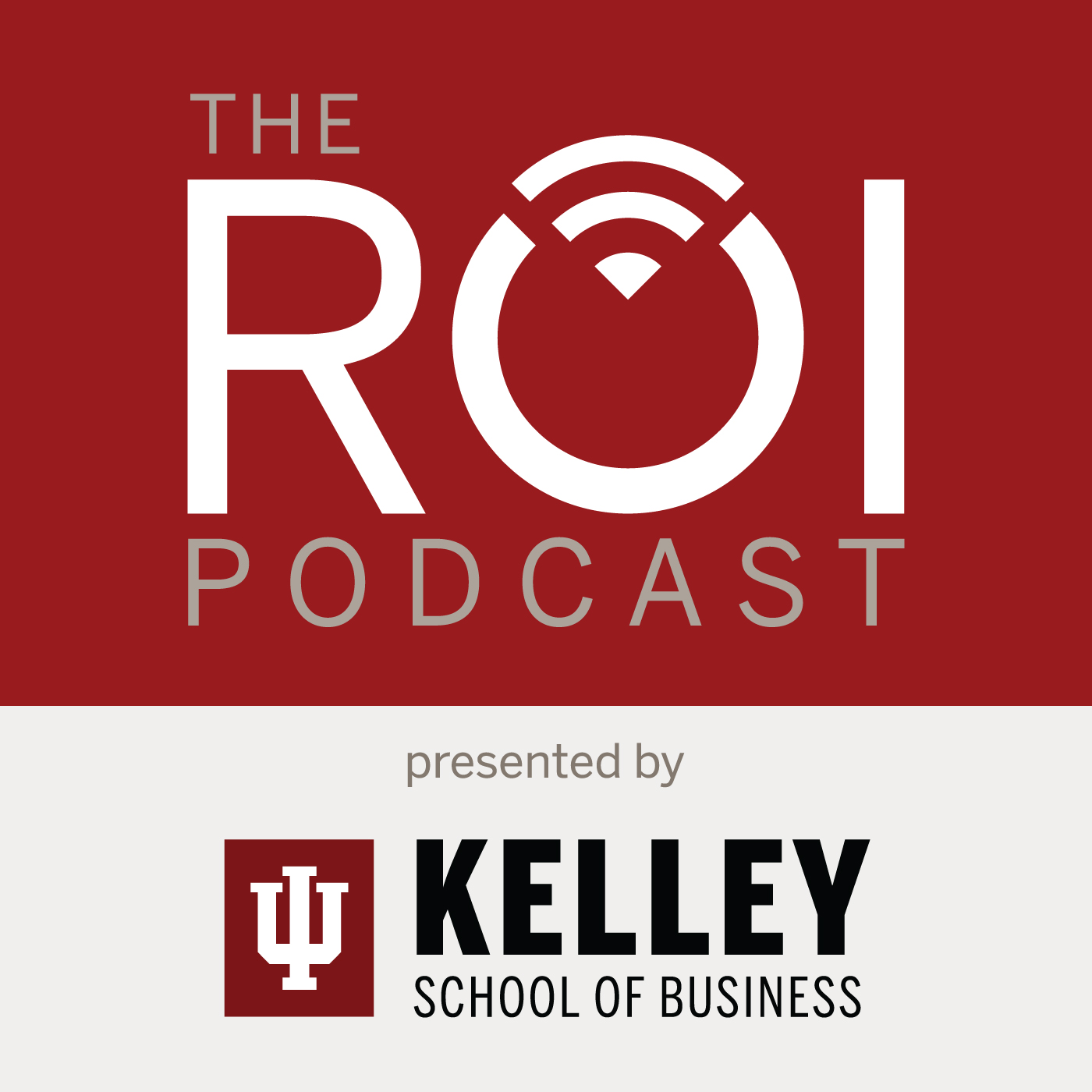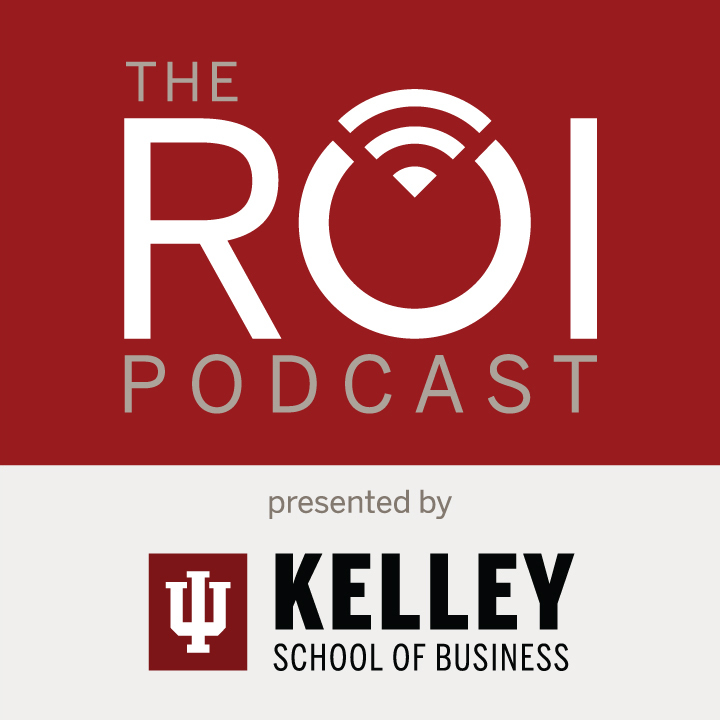
The ROI Podcast provides professionals from all industries with actionable insight from world-renowned faculty members at Indiana University's Kelley School of Business. Learn not only from award-winning faculty but business experts who are disrupting their respective industries. The ROI Podcast equips you and your organization with the knowledge to keep a competitive edge over the competition.
Episodes

Tuesday Feb 27, 2018
How to get more done with these productivity hacks | Ep. 39
Tuesday Feb 27, 2018
Tuesday Feb 27, 2018
Have you ever sat down at night and wondered, "Where did my day go? I feel like I didn't get anything done." We've all been there. Thankfully, there are some very simple hacks you can apply to your life that will allow you to stay laser focused and get more accomplished. Episode 39 of The ROI Podcast will explain these hacks so you can start getting more done.
----
Do you have a question? Looking to get help on a business decision? Know a great guest for our show? Email roipod@iupui.edu so we can help your organization make better business decisions.
----
Ready to take your next step? Check out if a Kelley MBA is right for you: https://bit.ly/3m2G6D5
----
Show Notes:
(ROI Podcast Music)
Shane: Welcome back! We are recording episode 39 of The ROI Podcast which is presented by the Indiana University Kelley School of Business – coming to you from downtown Indianapolis on the beautiful IUPUI campus. I am your host, Shane Simmons. And today, we’re bringing you an episode about productivity – and the 5 productivity hacks you can start implementing today so you can rock your life and business. And throughout this episode, we’re going to share productivity hacks from some of the greatest entrepreneurs out there, including Elon Musk and others. And we’ll even hear from one of our Kelley School alumni, Scott Abbott, on how he’s able to get more done and face those tasks we all dread tackling. So let’s start with Scott – who says – you’ve got to start writing your tasks down, which will help you hold yourself accountable.
Scott: Let’s take all that stuff that keeps you up at night and deal with it, move it on, do something with it so you can get it out of your life and business. Then you need to go execute! This doesn’t automate you, you still got to go back to work and follow through. It’s so much easier now because you’ve documented it, agreed as a team that this is how you’re going to get rid of it, and now you hold yourself and everyone else accountable for getting it done - you can't hide! I believe you can do that with yourself in your own life as well by assuming and thinking you've got a board of directors, even though it's just you in your house. Write things down, check off your list, make sure you’re getting these issues out of your life – by the way, issues can be also be good, just like how the word “argument” socratically is not necessarily bad because it helps people get through some of the sensitivity of things and get to what needs to be done. So that’s the whole point, get it out there, debate it, solve it, and move on.
Shane: So there’s productivity hack number one: create a list of tasks that need to be completed. Start tackling those tasks and marking them off, and when you can, solve the assignments you are least excited about because once those are off your plate, you can create momentum and relieve the burden of keeping those tasks lingering around. Its ultimate those tasks we continue to procrastinate on that weigh on us the most – but by clearing those and tasking massive action – you can free yourself from that feeling. Here’s productivity hack number two from Scott:
Scott: you need a system – one that’s proven, that’s clear and has results. You put both of those things in your life, the generations come together, the business does better, and the individual lives a tip-top life.
Shane: So hack number two is to have a system in place. You can’t just be blind and firing at the hip – you need to have an actionable plan together, looking at the big picture, and then breaking that down into small, actionable steps to accomplish the task at hand. And this is what the greats do. They don’t get overly stressed out because they look at the big picture, then break that down into daily and even hourly tasks. For example, we interviewed Laura Vanderkam a few months back. Now Laura is the author of many books, including 168 hours – which is a magnificent read on time management. And Laura suggests breaking your days downtown a spreadsheet so you can set specific times to accomplish tasks. Take a listen:
Laura: I use a spreadsheet to track my time. It’s just excel, nothing fancy. It’s got half hours blocks on the left side and the days of the week across the top and so it’s 336 cells to represent 168 hours. And I just fill it in as I go. I wake up, I write what time I wake up, and a couple times a day write what I’ve done since the last time I’ve checked in. And it doesn’t have to be perfect, I can say stuff like “work” or “hang-out with kids” or “drive somewhere” or “eat dinner” – whatever it is.
Shane: So for Laura – she’s breaking that time down into 30 minute increments, keeping track of her tasks, and ultimately this gives her a view of where she’s spending her time and maybe where she could begin dedicating some of her tasks. So time management is super important here. Take Elon Musk as an example. He’s the CEO of two companies who’ve taken the world by storm – both in Tesla and Space X. According to Elon, he works between 85-90 hours a week between the two companies. And he takes it a step further: breaking his days down into 5 minute increments. And our final productivity tip is one that too many of us need to work on and that’s handling email – and how not to let it bog you down. Here’s Laura Vanderkam on how to get around this:
Laura: Email expands to fill the available space. And so the only way to spend less time on email is to choose to spend less time on email. There’s no one “hack” that’s going to make your inbox be under control. It’s absolutely a decision you must make to decide how much time you are willing to allocate to this. So as much as possible, designate a few times throughout the day to check email. Even if you have to check very frequently, you’re better off checking say for 15 minutes once an hour as opposed to checking constantly on and off through a day. So 45 minutes off and 15 minutes on would be a way you can do it. If you can go longer that’s great. You could be off for 90 minutes, you could be off for two hours, awesome.
Shane: So as we close this productivity version of The ROI Podcast – consider what we’ve heard from guests on the show: Create a list of tasks you need to accomplish, put a system in place to accomplish these tasks you’ve setout to do. Create a time audit and schedule particular time slots for certain tasks and DEDICATE your time to those time slots. And finally, don’t let email be a distraction. Set specific times to opening and sending emails, and if you stick to those times, you’ll notice a jump in how much you can do!
(The ROI Podcast Music)
Shane: So that is our productivity hack episode of The ROI Podcast. We want to thank Scott Abbott for being on the show and giving us some insight. And of course, Laura Vanderkam sharing her interview from a few months ago and how she's tackling productivity. And of course we are going to come at you with more of these types of episodes in the future, but for next week we are going to pick back up on our CEO series where we are diving in to see how the best CEOs are able to grow their companies and thrive in life. So, be sure to stay tuned for that. Don't forget to subscribe to The ROI Podcast and leave us a review on iTunes. Other than that, we will be here next week with another episode for you all.

Comments (0)
To leave or reply to comments, please download free Podbean or
No Comments
To leave or reply to comments,
please download free Podbean App.